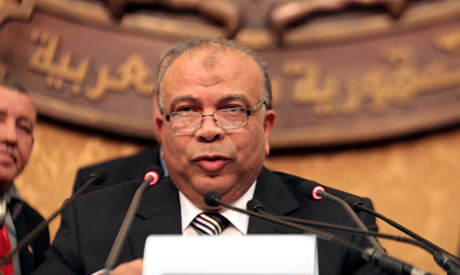 According to independent daily Al-Shorouk, Parliament’s legislative affairs committee on Saturday referred new draft guidelines for the formation of a constituent assembly – tasked with drafting a new constitution – to Parliamentary Speaker Saad El-Katatni.
According to independent daily Al-Shorouk, Parliament’s legislative affairs committee on Saturday referred new draft guidelines for the formation of a constituent assembly – tasked with drafting a new constitution – to Parliamentary Speaker Saad El-Katatni.
A joint meeting between the upper and lower houses of Egypt’s parliament is expected to be held soon to approve the new guidelines. Both chambers will subsequently elect members of the new constituent assembly based on the approved guidelines.
"We delivered a full report to El-Katatni including all recommendations and requesting a joint meeting,” said Mohamed El-Omda, deputy head of the legislative committee. “If we issue the law without referring to the Shura Council, the law will lack legitimacy.”
Wahid Abdel-Meguid, independent MP and coordinator of the Muslim Brotherhood's Democratic Alliance for Egypt coalition, who plays a mediating role between Egypt’s various political forces in the constitution-drafting process, stated that the legislative committee was "working unilaterally, largely disregarding what political forces have agreed upon. The new draft only represents procedural arrangements.”
The new guidelines for the formation of the constituent assembly consist of 13 articles governing the functioning of the assembly.
According to the proposed articles, the assembly should draft a new constitution within one month of the new guidelines being issued, while the assembly should represent all segments of Egyptian society.
The proposed articles also stipulate that Parliament receive candidacy recommendations for assembly members from various public institutions, parties and groups, as well unions and syndicates.
In April, Egypt’s Supreme Administrative Court suspended a constituent assembly elected by members of parliament, which, the court ruled, had violated last year’s constitutional declaration.
Liberal and leftist assembly members withdrew from the constitution-drafting body in March to object to the large proportion of Islamist figures on the assembly. The withdrawals created a major headache for both the Islamist-led Parliament and the Muslim Brotherhood’s Freedom and Justice Party, who hold the most seats in Parliament, in terms of their efforts to draw up a new national charter.



